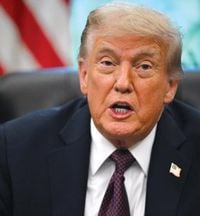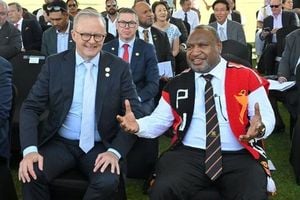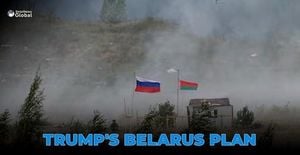On September 15, 2025, President Donald Trump announced that the U.S. military had conducted a second deadly strike this month against a boat allegedly carrying narcotics from Venezuela, intensifying what the administration has described as a campaign against drug cartels accused of flooding the United States with fentanyl and other illegal drugs. The strike, which killed three people, took place in international waters and was publicized by Trump in a dramatic social media post that included aerial surveillance footage of a speedboat exploding in flames.
"This morning, on my orders, U.S. military forces conducted a SECOND kinetic strike against positively identified, extraordinarily violent drug trafficking cartels and narcoterrorists in the SOUTHCOM area of responsibility," Trump wrote on Truth Social, referring to the U.S. military’s Southern Command. He asserted that the vessel was transporting illegal narcotics "headed to the U.S." and described the cartels as "a threat to U.S. National Security, Foreign Policy, and vital U.S. Interests."
The Pentagon later confirmed the strike was a Special Operations mission but offered no further details, instead directing inquiries back to the president’s social media announcement. The 27-second video Trump released showed a speedboat bobbing on the waves before a fiery explosion engulfed it. The identities of those killed and the specifics of the cargo remain undisclosed.
This latest strike comes just two weeks after a similar U.S. military operation on September 2, 2025, which targeted another Venezuelan boat and killed eleven people. According to The San Juan Daily Star, the first strike also involved a speedboat that had left Venezuelan waters and was suspected of carrying drugs. Trump’s administration has linked these actions to an ongoing effort to disrupt Latin American drug cartels, which it claims are responsible for a surge in drug-related deaths in the United States.
The Trump administration’s approach has included labeling several Latin American criminal gangs and drug cartels as “terrorist organizations,” a move that breaks with previous precedent since such groups are typically motivated by profit rather than ideology. This controversial designation has allowed officials to refer to suspected drug smugglers as “narco-terrorists,” though, as The San Juan Daily Star notes, the legal implications of this term are hotly contested.
The administration has also doubled down on its pursuit of Venezuelan President Nicolás Maduro, increasing the reward for information leading to his arrest from $25 million to $50 million. Trump has repeatedly accused Maduro of aiding drug trafficking operations and has sharply escalated rhetoric against the Venezuelan government. In August 2025, he ordered the deployment of U.S. warships in the Caribbean, citing the fight against drug cartels and the need to protect American interests. As of mid-September, the U.S. Navy has eight warships stationed in the region, and the Pentagon has dispatched armed MQ-9 Reaper drones and F-35 fighter jets to Puerto Rico.
Despite the heavy military presence—over 4,000 U.S. troops are reportedly in the area—there has been no indication that Washington plans a ground incursion into Venezuela. Nevertheless, the Venezuelan government has responded by urging its citizens to enlist in militias and participate in military training sessions, preparing for what it describes as a potential U.S. invasion. On September 13, tensions flared further when U.S. warship personnel boarded a Venezuelan tuna boat in Venezuelan waters, detaining nine fishermen for eight hours before releasing them. Venezuelan Foreign Minister Yván Gil condemned the incident as an "illegal and hostile" action, presenting photos and asserting the fishermen had authorization to work from the Ministry of Fisheries.
Venezuelan President Maduro has denounced the U.S. strikes as "heinous crimes" and "military attacks on civilians who were not at war and were not militarily threatening any country." He argued that if the U.S. believed the boat’s passengers were drug traffickers, they should have been arrested and prosecuted rather than killed. Maduro accused the Trump administration of seeking to provoke war, a claim Trump has dismissed. "We’re not talking about (regime change), but we are talking about the fact that you had an election which was a very strange election, to put it mildly," Trump said in response to Maduro’s allegation that Washington was seeking regime change through military threats.
Legal experts and congressional Democrats have sharply criticized the strikes. Rear Adm. Donald J. Guter, a retired top judge advocate general for the Navy, told The San Juan Daily Star, "Trump is normalizing what I consider to be an unlawful strike." Senator Jack Reed of Rhode Island, the senior Democrat on the Armed Services Committee, called the president’s actions "an outrageous violation of the law and a dangerous assault on our Constitution. No president can secretly wage war or carry out unjustified killings—that is authoritarianism, not democracy."
International law specialists have also weighed in, arguing that drug smuggling, while a serious crime, has never been equated with an imminent armed attack that would justify the use of lethal force in self-defense. Brian Finucane, a former State Department lawyer, stated, "The administration has not even seriously tried to present a legal argument to justify the premeditated killing of the people aboard these two vessels. The U.S. president does not have a license to kill suspected drug smugglers on that basis alone." Mary Ellen O’Connell, a professor of international law at the University of Notre Dame, echoed these concerns, saying the new strike "appears as problematic as the first" and questioning whether Trump "really knew who and what were on the boat, and where it was going."
While the White House has gestured at a justification based on national self-defense—citing the devastating toll of drug overdoses in the United States—critics note that Congress has not authorized armed conflict against drug cartels. In an interview with Newsmax, Trump’s top counterterrorism adviser, Sebastian Gorka, argued that congressional authorization was unnecessary because the cartels are not nation-states, a rationale that legal scholars have widely rejected.
Despite the uproar, Defense Secretary Pete Hegseth and General Dan Caine, chair of the Joint Chiefs of Staff, have signaled that more strikes could follow. Last week, they made an unannounced visit to Puerto Rico, where much of the U.S. military firepower is now concentrated.
As the situation in the Caribbean remains tense, the Trump administration’s actions have set off a fierce debate in Washington and beyond. Supporters argue that the strikes demonstrate a strong stance against the deadly flow of narcotics, while critics warn of dangerous legal precedents and the risk of escalation with Venezuela. For now, the world watches closely as both governments brace for what could come next.
The latest U.S. military strike, its legal and moral implications, and the diplomatic fallout have thrust the U.S.-Venezuela relationship into a new and uncertain phase, with the potential for far-reaching consequences on both sides of the Caribbean.




